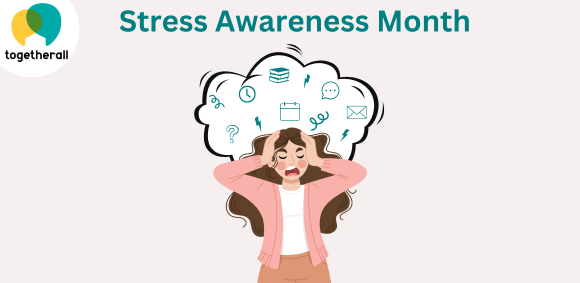April is national stress awareness month, a time to shine a spotlight on the importance of understanding and managing stress. Stress is an inevitable part of life but learning to manage it effectively can significantly improve your overall wellbeing.
Did you know? According to recent statistics, 79% of adults in the UK experience stress at least once a month and 74% have felt overwhelmed or unable to cope at some point in the last year. As well as 52% of all workers now battling burnout.
These statistics really emphasise that we need to raise more awareness about the importance of prioritising your mental health and implementing stress reduction practices that work for you.
Let’s look further into what stress is, how it affects the body and the steps you can take to help reduce its impact.
Understanding Stress
Stress is a natural response to challenging or threatening situations. It triggers the body’s “fight or flight” response, releasing hormones like adrenaline and cortisol to help us react quickly to situations that require focus and energy. Stress can be caused by a variety of things for example work, relationships, health concerns, financial problems, and life changes.
It’s important to also note that not all stress is bad. In fact, manageable levels of stress can be motivating and improve performance, helping individuals focus and achieve their goals. However, when stress becomes overwhelming and persistent, it can start to negatively impact your mental and physical health.
How stress can affect the body
Stress doesn’t just affect you mentally it can also affect you physically. Here are some of the symptoms that can occur alongside stress:
- Headaches
- Fatigue
- Heart palpitations
- Body soreness
- Chest pains
- High blood pressure
- Indigestion or heartburn
- Feeling sick, dizzy, or fainting
- Sudden weight gain or weight loss
- Sweating
Tips for managing stress.
- Exercise – physical activity releases endorphins, which can help reduce stress. Even a short walk can make a difference!
- Time management – poor time management can lead to you feeling overwhelmed and stressed. You could use tools like planners, apps and to-do lists to stay organized.
- Taking breaks – Regular breaks can help you recharge and prevent burnout.
- Get a good night’s sleep – Sleep is essential for emotional regulation and your overall wellbeing.
- Mindfulness and meditation – apps such as headspace and calm have guided breathing exercises and meditations, which aim to promote mindfulness, improve sleep, and reduce stress.
- Social support – spending time with friends or family can provide emotional support and help you talk out your stress and figure out the root problem.
- Hobbies and interests – engaging in your hobbies/interests can be a great way to unwind to distract yourself from stress.
- Limit caffeine and alcohol – excessive amounts of caffeine and alcohol can increase stress levels.
In conclusion, stress is an inevitable part of life that most people will experience at some point. However, by raising awareness and implementing stress reduction strategies, we can improve our overall well being and better manage the challenges life throws at us!
Support and resources for CAW students.
As a student of The College of Animal Welfare, you get FREE access to a wide variety of resources and support via the togetherall app; there is also a great short online course to help you manage stress and worry. Togetherall also has forums so you can discuss any worries with others, and access to trained counsellors 24/7. If you haven’t set up an account, you can do so FREE of charge with your CAW email address.
If stress is getting overwhelming and persistent to you, or if you are struggling with any aspect of college life, remember you can access up to six confidential counselling sessions free of charge: full details can be found here.

